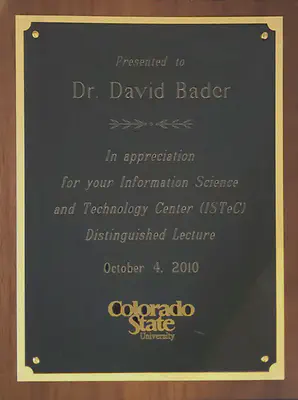Colorado State ISTeC Distinguished Lecture: Petascale Computing for Computational Biology and Genomics

Abstract
Graph theoretic problems are representative of fundamental kernels in traditional and emerging computational sciences such as chemistry, biology, and medicine, as well as applications in national security. Yet they pose serious challenges for parallel machines due to non-contiguous, concurrent accesses to global data structures with low degrees of locality. Few parallel graph algorithms outperform their best sequential implementation due to long memory latencies and high synchronization costs. In this talk, we consider several graph theoretic kernels for connectivity and centrality and discuss how the features of petascale architectures will affect algorithm development, ease of programming, performance, and scalability. Our large-scale graph algorithms are applied to real-world problems in phylogenetic reconstruction of evolutionary histories, inference of gene function in protein interaction networks, and cancer research.

Speaker Biography
David A. Bader is a Full Professor in the School of Computational Science and Engineering, College of Computing, at Georgia Institute of Technology. He received his Ph.D. in 1996 from The University of Maryland, was awarded a National Science Foundation (NSF) Postdoctoral Research Associateship in Experimental Computer Science. He is an NSF CAREER Award recipient, an investigator on several NSF and NIH awards, was a distinguished speaker in the IEEE Computer Society Distinguished Visitors Program, and a member of the IBM PERCS team for the DARPA High Productivity Computing Systems program. Bader currently serves on the NVIDIA-Cray team under the DARPA Ubiquitous High Performance Computing program. Dr. Bader directed the Sony-Toshiba-IBM Center of Competence for the Cell Broadband Engine Processor. Dr. Bader also serves on the Research Advisory Council for Internet2, the Steering Committees of the IPDPS and HiPC conferences, and is the General Chair of IPDPS 2010 and Chair of SIAM PP12. He is an associate editor for several high impact publications including the ACM Journal of Experimental Algorithmics (JEA), IEEE DSOnline, and Parallel Computing, has been an associate editor for the IEEE Transactions on Parallel and Distributed Systems (TPDS). He is an IEEE Fellow and a Member of the ACM. Dr. Bader’s interests are at the intersection of high-performance computing and computational biology and genomics. He has co-chaired the IEEE International Workshop on High-Performance Computational Biology (HiCOMB), co-organized the NSF Workshop on Petascale Computing in the Biological Sciences, written several book chapters, and co-edited special issues of the Journal of Parallel and Distributed Computing (JPDC) and IEEE TPDS on high-performance computational biology. He has co-authored over 100 articles in peer-reviewed journals and conferences, and his main areas of research are in parallel algorithms, combinatorial optimization, and computational biology and genomics.